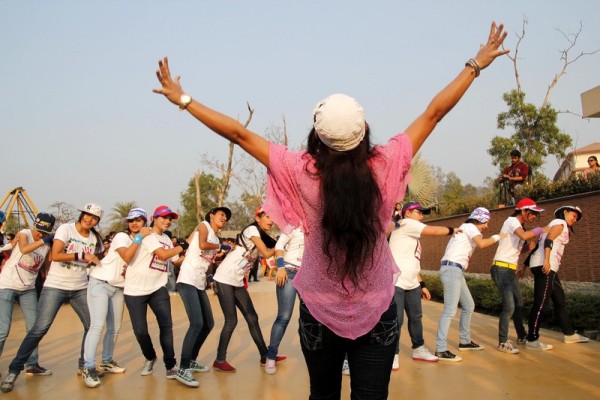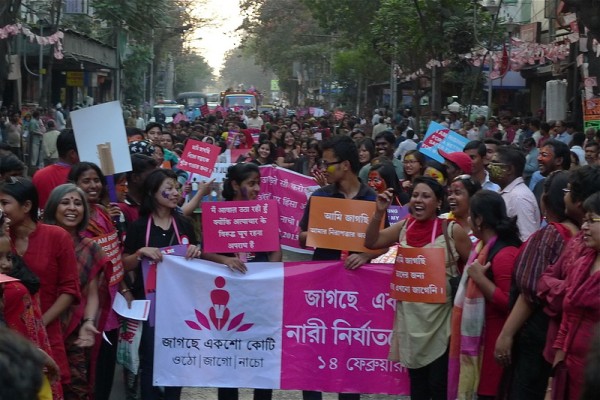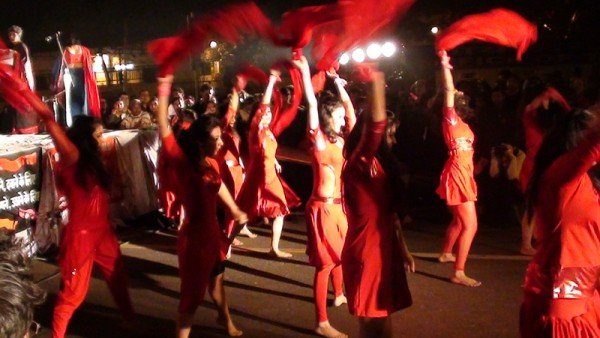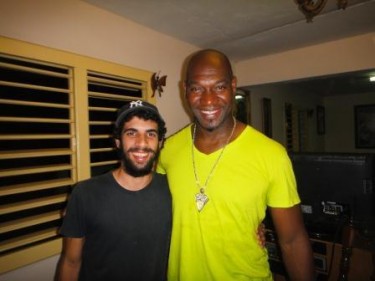[All links lead to German language websites]
On January 25, 2013 an #Aufschrei (outcry) rang out through the German-speaking blogosphere in response to an article in Stern, a weekly German news magazine. Journalist Laura Himmelreich reported on an encounter with Rainer Brüderle, a politician from the Free Democratic Party (FDP), who allegedly made remarks about her buste and approached her inappropriately. Himmelreich's experience is just one of many examples of sexism that exists in everyday life.
Using the hashtag #aufschrei (#outcry), female Twitter users have been reporting their experiences of similar cases of everyday sexism, sexual harassment and, in some cases, even of sexual abuse. Below are some of the tweets:
@terrorzicke: Der Prof, der mir auf der Erasmus-Party zuraunte “I want to see you naked!” #aufschrei #England
@terrorzicke: The lecturer who whispered to me at an Erasmus party: “I want to see you naked!” #aufschrei #England
@Ine_12e: Ich näh die Dammnaht enger als vorher, da wird ihr Mann sich sicher drüber freuen. Arzt nach Geburt #aufschrei
@Ine_12e: I’m sewing up the perineal suture tighter than it was before, your husband should be pleased with that. A doctor after giving birth. #aufschrei

Street Art in Karlsruhe. Photo from Flickr by theodoritsis (CC BY-ND 2.0)
@KatiKuersch: Der Vorgesetzte, der mir sagte, ich müsse nur mal flachgelegt werden, dann ginge es mir psychisch sicher besser. #aufschrei
@KatiKuersch: The supervisor who told me I just needed to get on my back to feel psychologically better. #aufschrei
@marthadear: der vater einer schulfreundin, der auf ihrer geburtstagsfeier all ihren freundinnen poklappse gab. ich habe mich immer versteckt. #aufschrei
@marthadear: My friend's dad who smacked all the girls on the bum at her birthday party. I spent the whole time hiding. #aufschrei
@Wendelherz: Wie ich anfangs das Gefühl hatte, gar nix beisteuern zu können, und dann nach und nach alles hochkommt und ich kotzen möchte. #aufschrei
@Wendelherz: Feeling, at the beginning, that I couldn't add anything at all and then bit by bit, everything came up and I wanted to throw up. #aufschrei
hanhaiwen: Und all die Leute die auf solche Vorfälle jemals mit einem verständnislosen „ja und?“ reagiert haben. #aufschrei
hanhaiwen: And to anyone who has ever responded to such an incident with an unsympathetic, “So what?” #aufschrei
@sincerelyjurs: Und immer wieder das Gefühl, sexistische Situationen nicht als solche benennen zu dürfen, um nicht als Spaßbremse dazustehen. #aufschrei
@sincerelyjurs: And always feeling like you’re not allowed to label these situations as sexist, without being branded a killjoy. #aufschrei
MmeCoquelicot: Es geht nicht darum, dass ich mich nicht wehren KANN. Es geht darum, dass ich es nicht ständig müssen sollte. #aufschrei
MmeCoquelicot: It’s not that I can’t fight back, it’s that I shouldn’t always have to. #aufschrei
In the eyes of many Germans, sexism is not a problem that exists in today’s society. However, the tweets posted with the hashtag #aufschrei (outcry) show that this is not an accurate view and that sexism is in fact a common problem, even now. Journelle tweets:
Was ich an #aufschrei mag,ist,dass dieser “Minisexismus” in der Masse mal sein ganzes hässliches Gesicht zeigt und nicht runtergespielt wird.
What I like about #aufschrei (outcry) is that it’s bringing much-deserved attention to these abhorrent cases of casual sexism that might otherwise be ignored or trivialized.
Antje Schrupp writes about the newsworthiness of sexism and investigates the causes of this debate:
Auch viele Männer, die sich selbst gegenüber Frauen völlig korrekt verhalten, dachten bis vorgestern: Das ist zwar nicht schön, aber doch keine Nachricht – und suchten deshalb nach “Nebengründen”, die diese Veröffentlichung erklären könnten.
Es braucht aber keine weiteren Gründe, um so eine Story zu veröffentlichen, denn es gibt inzwischen massenweise Frauen und auch Männer, die das durchaus für eine Nachricht halten. Die sexuelle Belästigung keineswegs für eine Lappalie halten, auch dann nicht, wenn sie sich auf “niedrigem Niveau” abspielt.
Despite the unpleasant nature of these incidents, up until the day before yesterday, a number of men would not have considered them to be newsworthy, even those who treat women with dignity and respect. As a result, they have been trying to come up with additional reasons to justify the publication of these incidents.
But reports of this kind are considered newsworthy by masses of women, as well as men and so do not need any further justification in order to be published. Sexual harassment in any shape or form is by no means an insignificant matter.
Unfortunately, as so often happens in such debates, the uninformed and ignorant also feel the need to speak out and be heard. Below is one of the more friendly comments made by Twitter users criticising or ridiculing the campaign:
@robby_eberlein: #aufschrei Wie langweilig und trostlos muss der Alltag sein wenn man sich über solchen Nonsens dermassen aufregen kann…..
@robby_eberlein: #aufschrei (outcry) How boring and dull your life must be to get upset about this nonsense…
Meike Lobo took to her blog to criticise, among other things, the vagueness inherent in the terms ‘sexism’, ‘abuse’ and ‘sexual violence’:
Die Vermischung dieser Schlagworte überdramatisiert das Eine und — weitaus schlimmer — bagatellisiert das Andere. Die Grundhaltung mag bei allem eine ähnliche sein, nämlich die Objektifizierung des Gegenübers, aber das ist nach meinem Empfinden auch alles.
Kindesmissbrauch und Vergewaltigung sind schwerste Verbrechen und allein schon dadurch ganz klar zu trennen von Sexismus, der zwar oft unangenehm, schmierig und geschmacklos, aber eben kein Verbrechen ist. Solche schlimmen Verbrechen für die Lösung eines sozialen Problems zu missbrauchen, empfinde ich als Ohrfeige ins Gesicht aller Opfer sexueller Gewalt (sie selbst mögen das freilich anders empfinden).
For one thing, by using these catchwords together, the situation tends to be overdramatized and, far worse, trivialized. The main idea behind using each of these words may well be similar, namely, the objectification of the person subjected to it, but as far as I’m concerned, that’s also all it is.
Child abuse and rape are the most serious of crimes and are automatically differentiable from sexism, which, although often unpleasant, sleazy and tasteless, is not in itself a crime. In my opinion, misemplying such grave crimes in an attempt to solve what is essentially a social problem, is a slap in the face to all victims of sexual violence (who, of course, may well feel differently).
Sensitive Men
Some men have shown themselves to be rather more discerning and have vowed to react more sensitively to these issues in the future:
John tweets:
@einbequemesbrot: Schon krass, dass es heute noch so zugeht. Werde in Zukunft aufmerksamer sein. #Aufschrei
@einbequemesbrot: Disgusting that this is still happening in this day and age. Will be more considerate in the future. #Aufschrei
Alf Frommer reports on the change in attitudes triggered by this discussion on his blog Siegstyle.de:
Es steckt eben in jedem ein Brüderle. Eine Zoten-König oder ein Blicke-Belästiger. Ich sollte mein Verhalten überprüfen, auch wenn ich von mir selbst niemals annehmen würde, ich wäre ein Sexist. Aber vielleicht ist das gerade die Gefahr: ich halte mich für einen modernen Mann, der Frauen ernst nimmt und für die Gleichberechtigung und die Frauen-Quote eintritt. Trotzdem bin ich in einigen Dingen nicht besser als ein Ol’ Dirty Brüderle oder ein Franz-Josef Wagner, der eine Bildungsministerin zunächst mal nach dem Äußeren bewertet.
Daher bin ich froh über die Diskussion – weil ich darin in erster Linie eine Aufforderung sehe, mich selbst zu überprüfen.
There is a Brüderle [the FDP politician] hiding in everyone. A master of dirty jokes or a pervy old man. I should really look at my own behaviour, even though I would never consider myself to be sexist. But maybe that is where the danger lies. I consider myself to be a modern man, who takes women seriously and supports gender equality. Nevertheless, as someone who, at least initially, judged the Education Secretary based purely on her appearance, I am in some ways no better than an Ol’ Dirty Brüderle or a Franz-Josef Wagner [German tabloid columnist known to be sexist].
That is why I am pleased about the ongoing discussion. I see it as a prompt to reevaluate myself and my own behaviour.
By January 25, the Twitter debate had even reached the mainstream media:
Handelsblatt (a leading German language business newspaper) and Spiegel (a weekly German news magazine). In the meantime, the debate has spread to every type of media, including television. The main news programmes on public television have reported on the matter, while sexists and feminists took to political talk showa to debate the terminology being used, and whether sexism is even a problem.
The debate on sexism has escalated to such a height of publicity so quickly, primarily because it exposes the ongoing existence of a cultural phenomenon believed to have been long since overcome. As members of a modern society, Germans seem to think that sexism, gender stereotypes and the like have been left firmly in the past, but the reports surfacing on Twitter give powerful evidence to the contrary. Consequently, this has led to a passionate and emotionally-charged debate, that is, at times, lacking in respect and sensitivity to the subject matter.
Since then, the Twitter hashtag has gone global. See: #outcry and #assez.
via Global Voices » Feature http://globalvoicesonline.org/2013/02/11/from-whispers-to-outcry-sexism-in-germany/












